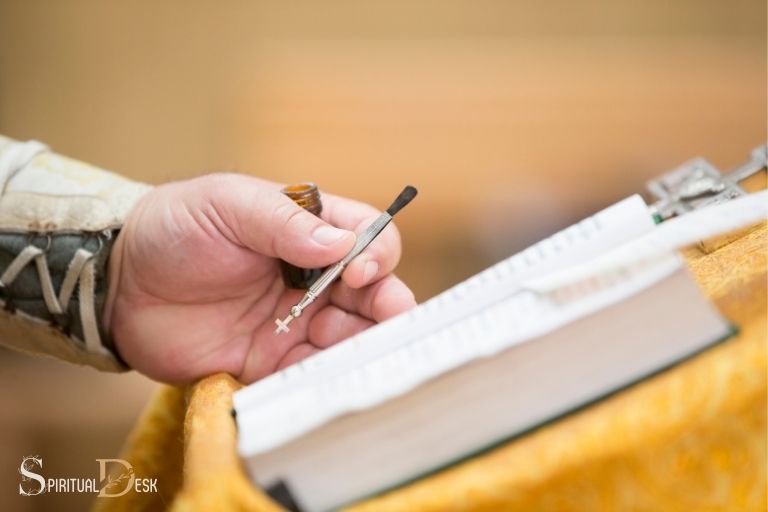What Is the Spiritual Meaning of Anointing? Consecrating
The spiritual meaning of anointing is the symbolic act of consecrating someone or something with oil, representing the empowerment and presence of the Holy Spirit in their life, and setting them apart for a specific purpose within their faith.
Anointing has been used in various religious traditions throughout history, most notably in Christianity, Judaism, and Islam.
It is a symbolic act that reflects the belief that the anointed person or object becomes sacred, and it signifies the bestowal of divine grace and protection.
The practice of anointing often marks a significant event or change, such as a religious ceremony, a rite of passage, or a divine calling.
In the Bible, anointing is mentioned in both the Old and New Testaments, often in the context of consecrating kings, priests, prophets, and sacred objects.
One of the most well-known instances is the anointing of King David by the prophet Samuel in the Old Testament.
In the New Testament, Jesus is often referred to as the “Anointed One” or the “Christ,” which means “the anointed.”
10 Terms of Spiritual Meaning of Anointing
| Term | Spiritual Meaning |
|---|---|
| Anointing | The act of applying oil, or another symbolic substance, to a person or object to signify a sacred purpose, consecration, or divine appointment |
| Consecration | The process of dedicating or sanctifying oneself or an object for a higher spiritual purpose |
| Oil | A symbol of the Holy Spirit and divine presence, often used in anointing ceremonies |
| Priesthood | Those who are authorized to perform sacred rituals, such as anointing, in a religious context |
| Holy Spirit | The divine presence and power of God, often associated with anointing in Christian and Jewish traditions |
| Anointed One | A term used to describe a chosen one, often a leader or messianic figure, who has been anointed and appointed by God to fulfill a specific purpose |
| Healing | Anointing can be associated with the laying on of hands and spiritual healing in religious traditions, such as Christianity |
| Empowerment | The act of anointing can symbolize the divine empowerment and authority given to an individual, enabling them to carry out their sacred mission |
| Protection | Anointing can be seen as a form of spiritual protection, consecrating a person or object to guard against negative influences |
| Initiation | Anointing is often used in religious initiation rites, marking the transition and commitment of an individual to a new spiritual path or level of understanding |
Key Takeaway

Five Facts About the Spiritual Meaning of Anointing
History Of Anointing
Anointing has been an essential practice in various religions worldwide. From christianity to hinduism, islam and judaism, the history of anointing varies according to each religion.
Discuss The History Of Anointing In Different Religions Such As Christianity, Judaism, Hinduism, And Islam
Christianity
In christianity, anointing with oil is a sacrament often practiced when one is sick. The priest blesses the oil, then applies it to the forehead and hands of the sick person, usually reciting a prayer.
The oil symbolizes the presence of the holy spirit, and the action serves as a means of receiving god’s grace and healing.
Judaism
The history of anointing in judaism dates back to ancient times. Anointing with olive oil was a significant rite of passage for high priests and kings.
In jewish tradition, anointing symbolizes royalty, holiness, and spiritual empowerment. To this day, ritual anointing is used in special prayers, such as during the shabbat.
Hinduism
In hinduism, anointing is a ceremony called abhishek or snan, primarily done to purify the mind, body, and soul. The oil used for anointing is a mixture of various herbs, and the ceremony is performed by a priest. The mixture is poured onto the individual’s head as a means of cleansing them from all earthly sins.
Islam
The history of anointing in islam is limited to the anointing of the dead’s body. Muslims believe that washing a dead person’s body with clean water mixed with camphor provides purification for the soul.
The anointing procedure is done alongside reciting specific prayers to seek allah’s mercy and forgiveness for the deceased.
Explain The Significance Of Anointing In These Religions
Christianity
Anointing with oil in christianity signifies healing, forgiveness, and restoration. It is known to offer peace to the body, mind, and spirit, reminding the individual of god’s presence and grace. Through anointing, one receives spiritual strength, protection, and guidance.
Judaism
In jewish tradition, anointing symbolizes a special relationship between appointed individuals such as kings and priests.
The act of anointing sets them apart, representing their spiritual ties to their people and their divine calling. Anointing with oil signifies divine favor, power, and loyalty to god.
Hinduism
In hinduism, anointing is a significant act of purification, both spiritually and physically. It cleanses the body from bad karma, purifying the mind and soul and inviting positive energy.
Anointing with oil signifies the renewal of one’s spiritual being, leading to spiritual awakening, enlightenment and transcending human limitations.
Islam
Anointing in islam is a means of purifying the dead’s body and ensuring their cleanliness and purity before entering the afterlife.
This process of purification is done with utter respect and dignity, with recital of specific prayers asking for allah’s mercy and forgiveness.
Religion and anointing practices may differ worldwide, but the underlying significance remains the same: cleansing and purifying oneself, spiritually and physically. Anointing with oil remains a sacred ritual, a means of receiving divine grace and favor.
Spiritual Significance Of Anointing
Spirituality is an integral part of human existence that we cannot ignore. It guides us on how to find meaning and purpose in life, allowing us to connect with our inner selves.
Anointing is one of the ways that people show their devotion to the divine, and it has immense spiritual significance.
In this section of the blog post, we will explore the spiritual significance of anointing in-depth.
Discuss The Spiritual Significance Of Anointing In-Depth
Anointing has been used for centuries as a way to show devotion to a higher power. It is a symbolic act that demonstrates reverence, commitment, and submission to the divine.
The following are some key points that explain its spiritual significance:
- Anointing is believed to be a way of inviting the divine presence to a person, object, or place. It is a way of calling on the power of the divine to bless and protect the person or object.
- Anointing is also believed to be a way of consecrating people, objects, or places for divine service. It is a way of setting apart something or someone for a particular purpose, and it is believed that the divine power would manifest in that thing or person, making it more potent and effective.
- Anointing is also seen as a way of connecting with the divine on a deeper level. It is believed that when a person is anointed, they are spiritually elevated, and they have a higher level of spiritual awareness and insight.
Explain How Anointing Is Believed To Connect An Individual With A Higher Power
Anointing is believed to connect an individual with a higher power by invoking the presence of the divine through a symbolic act. It is the physical representation of a spiritual connection that shows one’s willingness to submit to a higher power.
Here are some key points that explain how anointing connects an individual with a higher power:
- Anointing is a way of opening oneself up to receive the divine power. It is believed that when a person is anointed, they become spiritually receptive to the divine, which helps them to connect with a higher power.
- Anointing is also a way of demonstrating one’s faith in a higher power. It is a declaration of one’s belief that the divine power can intervene in one’s life, imparting blessings and protection.
- Anointing is also a way of acknowledging the power of the divine. It is a way of showing that the person recognizes that they are not the source of their power, but rather, they draw their strength from a higher power.
Mention How Anointing Is Believed To Impart Divine Blessings And Protection
Anointing is believed to impart divine blessings and protection in many ways, and it is a way of invoking the favor of the divine.
Here are some key points that explain how anointing imparts divine blessings and protection:
- Anointing is a way of seeking divine intervention in one’s life. It is the belief that the divine can intervene in situations and bless the person with good health, success, or prosperity.
- Anointing is also seen as a way of protection. It is believed that when a person is anointed, they are protected from harm, evil forces, or negative energies.
- Anointing is also a way of receiving spiritual strength and fortitude. It is believed that when a person is anointed, they receive the spiritual energy and power of the divine, which helps them to overcome obstacles and challenges in their lives.
Anointing has immense spiritual significance, and it is a way of connecting with the divine, receiving blessings, and protection.
Through anointing, a person can demonstrate their faith, reverence, and submission to a higher power, and receive spiritual strength and elevation.
Anointing is a powerful spiritual act that can transform one’s life, and we should embrace it as a way of deepening our spiritual connection with the divine.
Types Of Anointing Rituals
Anointing refers to the act of consecrating or dedicating someone or something to a higher power. This spiritual ritual is practiced across different cultures and religions and holds a significant place in their traditions.
Anointing is performed using different materials and methods, depending on the type of anointing ritual.
Let’s discuss the different types of anointing rituals and how they are performed.
Discuss The Different Types Of Anointing Rituals
There are several types of anointing rituals practiced around the world.
A few of them are:
- Religious anointing: This type of anointing is performed to consecrate someone as a representative of god. This type of anointing is practiced in different religions, including christianity, judaism, and islam. The religious anointing is also performed on religious items like chalices, vessels, and vestments.
- Healing anointing: This type of anointing is performed to heal a person’s physical, emotional, or spiritual ailments. It involves the application of holy oil or water on the person’s forehead, hands, or feet.
- Anointing of the sick: This type of anointing is performed to provide comfort and spiritual healing to a person who is seriously ill or suffering from a chronic illness. The anointing of the sick is performed by a priest or other religious person, and it involves the application of holy oil on the forehead and hands.
- Anointing of objects: Anointing can also be performed on inanimate objects to dedicate them to the higher power. For instance, anointing is performed on buildings, cars, and other objects to protect them from evil or negative energy.
Explain How Anointing Is Performed And What Materials Are Used For The Process
The process of anointing varies depending on the type of anointing ritual. However, some rituals involve the use of holy oil or water. The application is made on different parts of the body, such as the forehead, hands, and feet.
Other materials used in anointing include herbs, flowers, and other sacred objects.
In most religions, anointing is done by a religious figure or priest, who recites prayers and chants while performing the anointing ritual.
The anointing materials are blessed or sanctified prior to the actual application, a practice that ensures that the anointing is effective and pure.
Highlight The Differences In Anointing Rituals In Different Religions And Traditions
Different religions and traditions have their unique way of performing anointing.
For instance:
- In christianity, anointing is performed by applying consecrated oil on the forehead, hands, and feet. This can be done as part of the baptism ritual, to ordain someone as a priest, or as part of the anointing of the sick.
- In islam, anointing is performed using attar or perfume by applying it on the forehead or clothes. This practice is sometimes carried out before the start of any special occasion or event.
- In hinduism, anointing is performed using turmeric, sandalwood paste, or holy ash. These materials are applied on the forehead, chest, and shoulders as a sign of purification and blessings.
Anointing is a spiritual practice that holds significance across different religions and traditions, and it involves the consecration of someone or something to a higher power.
The application of holy oil or water, blessed objects, and other materials is integral to the ritual, which has different types and methods of performance.
Modern Applications Of Anointing
The Modern Applications Of Anointing
In the past, anointing was closely associated with religious and spiritual activities. However, in modern times, it has evolved to include non-religious contexts.
Here are some of the modern-day applications of anointing:
- Wellness and therapeutic healing: Anointing with essential oils is widely used in holistic therapies to help promote relaxation, relieve pain, and improve overall wellness. Different blends of essential oils are used to address various physical and emotional concerns.
- Sports and exercise: Athletes and fitness enthusiasts also use anointing for physical and psychological benefits. Some use essential oils to relieve sore muscles, improve blood circulation, and boost energy. Others use anointing to improve focus, enhance performance, and promote mental clarity.
- Celebrations and festivals: Anointing with oils is often used during festivities and celebrations. In some cultures, it’s used to bless individuals or objects during significant events such as weddings, graduations, and other ceremonies.
- Spiritual and religious practices: Although anointing has evolved to include non-religious contexts, it’s still widely used in religious and spiritual practices. Some churches or religious organizations anoint people with oil to consecrate them for various religious functions or to symbolize spiritual renewal.
How Anointing Is Still Relevant In Modern Times
While anointing is a practice that has been around for centuries, it still holds significance in modern times.
Here are some of the reasons why anointing is still relevant:
- Anointing is powerful and symbolic: Anointing has a unique symbolic value that transcends generations and cultures. It is a way of conveying a particular message or blessing and acknowledges the spiritual significance of an event.
- Anointing can be used for physical and emotional healing: The use of essential oils in anointing has given the practice added significance, and many people use it for its proven therapeutic benefits.
- Anointing can foster connection and community: Whether used in a religious or non-religious context, anointing can help people feel connected to others and tap into a deeper sense of community. The shared experience of anointing can create a sense of shared purpose and meaning.
- Anointing can aid in spiritual growth and transformation: Anointing can serve as a catalyst for spiritual growth and transformation. It can help people connect with their inner selves, deepen their spiritual practice, and experience new levels of enlightenment.
Examples Of How Anointing Is Practiced In Various Modern-Day Contexts
Anointing has evolved to include a broad range of modern contexts, including health, wellness, and sports.
Here are some of the examples of how anointing is practiced in various modern-day contexts:
- Aromatherapy and massage: Anointing with essential oils is used in aromatherapy and massage to promote physical, emotional, and spiritual well-being.
- Yoga and meditation: Some yoga and meditation practices incorporate anointing to enhance the experience and promote relaxation and focus.
- Sports and exercise: Many athletes use anointing with essential oils to improve their physical performance and boost their mental focus.
- Celebrations and festivals: Anointing with oil is a common practice during festivities and celebrations. In cultures worldwide, it can be used to bless and consecrate people and objects during significant events such as weddings and religious ceremonies.
- Religious and spiritual practices: Anointing has deep-rooted significance in religious and spiritual practices, and it is widely used in different faiths and traditions.
Anointing has a long-standing history and cultural significance. In modern times, it has evolved to encompass non-religious contexts, and the use of essential oils has enhanced its therapeutic benefits.
While the practice may have changed over the centuries, it remains meaningful and relevant to people of various cultures and beliefs.
FAQ About What Is The Spiritual Meaning Of Anointing
What Is The Spiritual Meaning Of Anointing?
Anointing is a biblical practice that signifies being chosen, set apart, and empowered for a particular purpose by god’s grace.
What Is The Significance Of Anointing Oil?
Anointing oil symbolizes the holy spirit’s presence, power, and anointing, enabling individuals to receive physical, emotional, and spiritual healing.
Who Can Perform An Anointing Service?
Anointing services can only be performed by an ordained minister or a priest, although some religious traditions allow for laypersons to undertake such services.
When Should One Seek Anointing?
One may seek anointing when facing a significant life event or difficulty, such as illness, emotional stress, or uncertainty about one’s life’s direction.
What Is The Difference Between Anointing And Baptism?
Baptism is a ritual cleansing that signifies one’s public declaration of their faith and commitment to jesus christ, while anointing is a spiritual act of consecration.
Conclusion
The spiritual meaning of anointing is closely related to the concept of consecration and holiness. In the bible, anointing was a ritual practice to set apart individuals or objects for a special purpose.
Today, anointing can be seen as a symbol of spiritual power and authority, both in religious contexts and beyond.
Whether you view anointing as a sacred practice or a metaphorical representation of blessings, there is no denying its profound significance and impact on our spiritual lives.
By acknowledging the divine presence within us and around us, we can tap into the power of anointing and experience a sense of peace, guidance, and purpose.
As we continue to explore and deepen our understanding of the spiritual meaning of anointing, may we be ever more mindful of the sacred nature of our existence and our connection to the divine.






